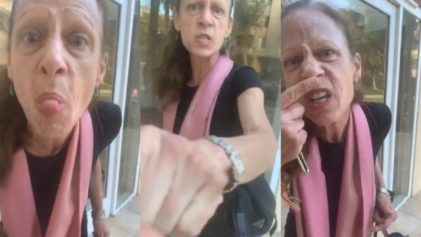
The story reveals that salespeople would joke and make fun of customers who they believed didn’t belong at Barneys—and it was usually African-Americans who received the brunt of the ridicule.
“Their card is probably not going to go through,” the former sales associate said the other employees would say. “I don’t know why they come in here and want to try stuff on that they know they’re not going to buy.”
“If a Black person comes in with a sweatshirt or sneakers, some of the white sales associates would be on the floor saying: ‘Why are they even here? They’re probably going to scam,'” said the former associate, who is Black and worked at the store in 2012 and 2013. “They would say this stuff in front of me. Sometimes I would just walk away, and sometimes I would say, ‘You never know.'”
According to the Huffington Post, store security keeps a close eye on Black shoppers who don’t look famous.
“If you’re Black and come in with an entourage, you won’t be followed because they’ll be like ‘Oh, that’s somebody famous,’” the employee said. “But if you come in by yourself or with one other person, then you’re going to be followed.”
But even famous Black shoppers aren’t completely safe, as one former employee recalled, referring to the time he was working at Saks Fifth Avenue and stopped the rapper Lil’ Kim.
“He said, ‘Sometimes you think certain rappers have money, but just because they have money doesn’t mean they don’t shoplift,'” the former employee said he was told.
The accusations of racial profiling lodged against New York department stores Macy’s and Barneys have reached the state attorney general’s office, as State Attorney General Eric Schneiderman has asked the two department store chains to turn over information about their policies for detaining and questioning customers based on race.
But in their defense, both department stores are trying to shift the blame to the New York Police Department.
“This was an operation of the New York City Police Department,” Macy’s spokeswoman Elina Kazan said in a statement, adding that store “personnel were not involved” in the incident.
In addition, Barneys Chief Executive Mark Lee likewise said his employees had no part in two incidents involving Black customers.
“We believe that no Barneys employees were involved in those incidents,” Lee said after a meeting in Harlem with civil rights leader Al Sharpton and members of his National Action Network. “No one from Barneys brought them to the attention of our internal security, and no one from Barneys reached out to external authorities.”
NYPD chief spokesman John McCarthy countered those claims, saying that in both Barneys’ incidents and the Macy’s case, officers were acting on information provided by store security.
“In both instances, the NYPD were conducting unrelated investigations” in the store, Reuters quotes McCarthy as saying.
A fourth shopper in New York stepped forward last week claiming that he was racially profiled after he made an expensive purchase at Macy’s Herald Square, which has also been accused of racial profiling by actor Robert Brown.
In the past decade, according to the HuffPo, Neiman Marcus, Macy’s, Dillard’s and Kohl’s have each been sued for alleged racial profiling. In 2000, thousands protested against Lord & Taylor after its security guards were accused of strangling a Black man to death in a confrontation over alleged shoplifting.
In a 2007 Gallup survey, 28 percent of Black people polled said they had been singled out while shopping in the previous 30 days because of their race. Even President Obama has talked about the phenomenon.
Even when Black customers dress up, they can’t expect equal service, Jerome Williams, a business professor at Rutgers University who has studied discrimination in retail stores, told the Huffington Post. He said numerous studies have shown that Black customers who dress up get a lower level of service than white customers who dress down.
“When it comes to elitism and race, it’s all interactive and all connected,” said Williams. “When you look at the givens, race still comes into the picture.”


